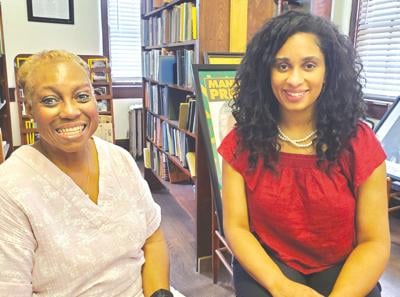Warren County and its place in history will be in the spotlight on Friday at Shauna Williams, president of the Warren County Community Center Board of Trustees, will be the keynote speaker for the 2022 NC Black Environmental Injustice and Healthcare Summit: Grounded in Justice, Rooted in Wellness.
The inaugural event, presented by the North Carolina Black Alliance, will be held virtually beginning at 9:30 a.m.
Williams is no stranger to sharing Warren County’s history, especially as it pertains to the Community Center. What became known as the Warren County Community Center was founded in 1934 at the Warren County Community Center and Library, Incorporated, through the efforts of local teacher, Winnie B. Williams. The building was constructed to provide a public meeting space, library, recreation rooms and restrooms for African Americans during a time when there was nothing in Warren County to meet those needs. The Community Center was built by contributions from Warren County residents, the Works Progress Administration, and the town and county commissioners.
In January of this year, the Community Center was featured during the North Carolina Museum of History’s African American Cultural Celebration. During the virtual event, Shauna Williams presented “The Warren County Community Center and the Birthplace of the Environmental Justice Movement” to reflect the celebration’s theme, “Black People, Green Planet: Environmental Justice.”
Williams told the newspaper that as a result of her participation in the Cultural Celebration, representatives from the North Carolina Black Alliance contacted her about making opening remarks during the Aug. 12 NC Black Environmental Injustice and Healthcare Summit. She was challenged to reflect on parallels between the birth of the Community Center and the birth of the Environmental Justice Movement and to “thread the needle” to explore other connections that came to mind. After the North Carolina Black Alliance reviewed her prepared presentation, Williams was notified that she would not give opening remarks after all. Instead, she would be the keynote speaker.
Her new role allowed her to provide a deeper insight into the topics should would have addressed in her opening remarks.
She explored connections between the Community Center, the PCB protests of 1982 and birth of the environmental justice movement from her unique perspective on Warren County, first as an outsider and, later, as a longtime community resident. Williams was a reporter for WTVD in Durham when she made her first trip to Warren County in 1978. She and a camera crew traveled between Warren County and Durham for five nights to cover the dumping of PCBs in the area so that her reports could air on the 11 p.m. news.
Her connection to Warren County became more personal after she married Warren County resident Yarbrough Williams and made the local community her home.
The Williams family holds a unique connection with the 1982 PCB protests. Oldest daughter Consherto Williams, then age 13, was so moved that she wanted to join the protests and did not hesitate after her parents granted permission. A photograph of Consherto and another young student with arms around each other, chanting and holding signs might be among the most famous from the PCB protests.
Shauna Williams drew upon these memories and other recollections from that era as she finalized her keynote speech. Among them were health problems experienced by people living near the PCB landfill in Afton. Five years after the PCB protests, Consherto’s birth mother died of cancer at the age of 36. Other people living in the area were diagnosed with cancer, including two South Warren Elementary School students. A number of the local cancer patients later succumbed.
“One of the greatest tragedies that that there has not been a full documentary of the health effects (of the PCB landfill),” Williams said.
Her reflections about the time of the PCB protests were not completely sad. Williams believes that Winnie B. Williams’ example of addressing a need with her idea for what would become the Community Center provided lessons decades later for the people who would march in protest of the PCB landfill in Afton.
These reflections provided the foundation as Shauna Williams expanded her opening remarks to develop her keynote address for Friday’s summit. That speech encompasses a far-reaching theme exploring the connection between the 40th anniversary of the PCB protests and birthing the environmental justice movement to the present time, including Warren County’s environmental justice legacy.
Representatives from the North Carolina Black Alliance traveled to the Community Center late last month to pre-record Williams’ keynote address and a question-and-answer sessions with the Alliance’s Deputy Director La’Meshia Whittington. These recorded segments will be aired during the Summit, but Williams will also participate live to answer audience questions.
She is grateful for this new opportunity to share the story of the community she calls home. Williams hopes that the Summit’s audience will draw inspiration from Warren County’s role in history, and that local residents will view their community in a new light.
“Warren County may have lost the battle, but we birthed a movement,” she said.
The inaugural 2022 NC Black Environmental Injustice and Healthcare Summit: Grounded in Justice, Rooted in Wellness, will be conducted on Friday, Aug. 12, beginning at 9:30 a.m. Registration for the virtual event remains open and is free of charge to the public. To register or for more information, visit https://ncblacksummit.org/EJH/.







Commented
Sorry, there are no recent results for popular commented articles.